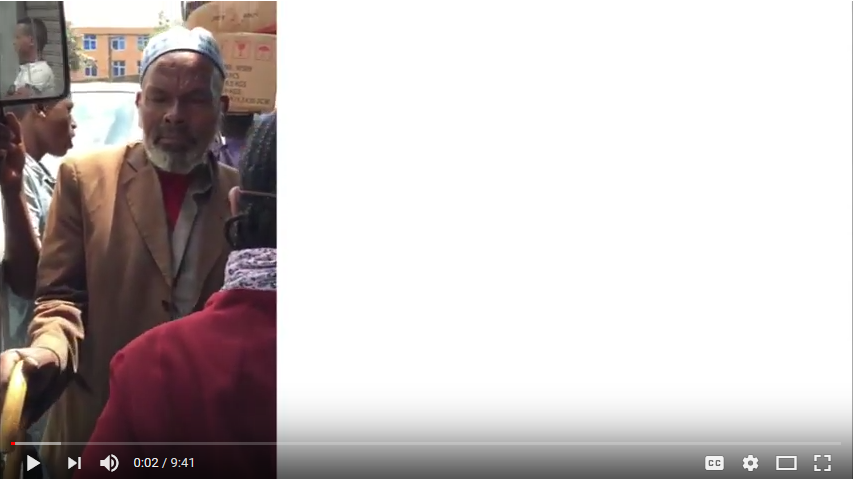
The Faculty of Architecture, KU Leuven - University of Leuven (Ghent/Brussels, Belgium) and the Chair of Architecture and Design II, AAU EiABC (Ethiopia) joined forces and work on a development project for Merkato in Addis Abeba. The project is part of the Streetscape Territories research project (Department of Architecture, KU Leuven - University of Leuven, Belgium), an international collective research practice that focuses on the transformation of the urban fabric through architectural and urban intervention, considering the making of diverse and tolerant streetscapes the main objective to achieve socially, economically and environmentally sustainable environments for its inhabitants. The research collective deals with the way architectural and urban interventions, open spaces, the property structure and its inherent accessibility and permeability, configure streetscapes as manifestations of social and productive encounter and how their inhabitants can give meaning to them by appropriation. The projects of this collective include systematic and comparative analysis of existing neighborhoods, streetscapes, public spaces, urban landscapes or complex buildings in different locations, based on research by design. Analysis and proposals are based on multiple approaches from different disciplinary fields. The projects have each a strong in-situ dimension and seek to help to develop real-life projects with local stakeholders. Besides projects in more developed contexts like New York, Ghent or Brussels, the project also focuses on developing contexts, leading to a multiple understanding of its main concepts and methods to this developing condition (Addis Abeba, Havana, Guyaquil, Onitsha, Karachi...).
EiABC as an academic institution and local partner in this development project, has a long tradition of contributing to the development projects and work together with local communities, planning agencies and policy makers.
Around 35 international participants, from graduating students to young professionals in architecture, urban design, urban planning or environmental studies, discuss and propose strategies for sustainable development of the Merkato area. The project started in January 2017 in Belgium, where master students (Faculty of Architecture, KU Leuven - University of Leuven) started studying the Merkato area from a triple point of view: mobility, productivity and housing. The achieved insights were then used for a 5 week on-site research project that ended with a joint Summer School of EiABC and KU Leuven - University of Leuven (September 12-21 2017). The team now presents a set of development strategies for the Merkato area in Addis Abeba that will be developed in the following months with the local partners.
Addis Abeba is the capital of Ethiopia and the capital of the African Union, characterized by an increasingly growing population -currently around 3 million inhabitants registered in 2007. The metropolis is in full transformation and counts an increasing number of foreign investments, mostly related to real estate development and infrastructure. The focus of this development project is on the Addis Merkato area -officially the Addis Ketema district- that is the largest open air market in Africa, employing an estimated 13,000 people in 7,100 business entities. Addis Merkato was originally instituted by segregationist policies of the Italian occupational government in the early 20th century. The Italians called this place also "Merkato Indigino" (which means market of the indigenous), as they also set up a "European equivalent", illustrating their policy of clear segregation. The Merkato area did not have any urbanistic plan and gradually grew taking different categorical stocks called "terras". The market combines formal as well as informal settings and includes permanent as well as ephemeral activities. It can also be understood as a place where production, consumption and storage is combined in an emergent way but representing a substantial part of the local economy.
The international team of researchers and practitioners now presents sustainable development strategies that cover the field of programming the area (productivity, consumption and residential functions), defining mobility policies (individual and public transport of formal and informal nature), determining building envelope guidelines (height of buildings and position in the streetscape), suggest design tactics for accessibility and permeability (including guidelines for implementing commercial strategies related to the streetscape) and for adding facilities (sanitary, health and community hubs) and infrastructure (paving, electricity, water, sewage, telecommunication) to the development area.
More information about the proposals can be found at www.streetscapeterritories.org and www.eiabc.edu.et
Addis Abeba, September 20th 2017
Addis Abeba team: Habtamu Nekatibeb, Kaleab Kebede, Elham Mohammed, Metasebia Tolossa, Michael Tesfaye, Biniam Hailu, Michale Hailegebriel, Omer Awolkhair, Amanuel Bayu, Eyosias Tekle, Dawit Gudisa, Kidus Yohannes, Bemnet Dwmissie, Yonatan Abate, Sabontu Adisho, Yared Adam, Nuhamin S/Michael,, Negede Samuel, Robel Tsigedingil, Yasmin Abdu Bushra, Ruby Taye, Fasika Solomon, Rasya Kumar, Vincent Chukwuemeka, Omar Ahmed, Siddharth Thyagarajan, Yishak Teklegiorgis , Maelle Vandenbergh, Simen Lambrecht, Arnout De Schryver, Matteo Paracchini, Yannick Sluyts, Luna Catteeuw, Pille Koppe, Eda Uraz, Nguyen Vu Hoang Thong, Tom Schoonjans, Marisa Borabo, Addis alem Feleke, Kris Scheerlinck.

